The first time Maj. Drew Armey set foot in Ukraine, he visited the country’s Air Force Headquarters in Vinnytsa, which had just been bombed. He also visited Vasylkiv Air Base, about 15 miles outside of Kyiv, which had been assaulted from the ground and air.
“The Air Force had been flying sorties in Donbas,” he said in an interview in mid-March. “[They] had a lot of airplanes shot down… [and had] taken some losses, and so that was the environment we went into in 2015.”
At the time, Armey said, the U.S. wasn’t as aware of the “ongoing conflict,” but the guardsmen from the 144th Fighter Wing of the California Air National Guard met with Ukrainian pilots, some of whom “had been shot down and managed to evade capture.” The meeting was part of the unit’s years-long relationship with the country through the State Partnership Program.
“We learned a lot about what they were doing tactically to try to be effective in a really difficult situation,” said Armey, who also met his wife, Anastasiia on that trip.
Now, as his friends – and some family members – are in Ukraine while Russia’s invasion stretches on, the Armeys have created a fundraising campaign, Stop the War in Europe, to help those in need.
The campaign went live a couple of days after Russia invaded Ukraine. From a timing perspective, once the Armeys knew that Anastasiia’s family was safe, there was a sign of relief – but the thoughts that followed prompted them to create the campaign.
“Then it’s like, what about all the other families?” Armey said. “That was really the event… For one, some of her family is about to go back and fight the war. On the other hand, other families aren’t as lucky and as supported.”
Ukrainian connection
Anastasiia’s family safely left Ukraine and was in Poland as of mid-March, now among the roughly 3 million refugees. Armey said he expects more family members to secure refugee status, and the Polish and Romanian populations have been “extremely welcoming.”
With their family currently out of the epicenter of harm’s way, Armey and his wife have focused Stop the War in Europe on providing volunteer forces with medical supplies.
“While our family is relatively taken care of in Poland… The frontline folks volunteering… [are] directly impacted by the conflict and are in definite need of things,” he said. “From a personal perspective, it’s really tough, and we kind of felt like we had to do something.”
One of the toughest parts, both personally and professionally, has been watching the events unfold from the sidelines. Armey said Ukrainian citizens are making Molotov cocktails and “figuring out AK-47s.”
“When you realize [they are using] body armor, not with the right equipment or training… It’s a really brave thing to do,” he said. “So that is personally really touching, and what you see [from] the nonmilitary population is extremely touching to us.”
Still seeking Stop the War in Europe donations
Armey said that while Stop the War in Europe has received medical supply donations, they continue to reach out to hospitals through their personal networks. Some supplies they’ve received include bandages that might have recently expired but are still “completely usable.”
“It’s a hard thing for active duty military…” he said. “The U.S. isn’t going to, through official channels, send an expired bandage even though it’s perfectly good.”
Frontline units, according to Armey, need basic trauma kits that include items not necessarily in a home first-aid kit, such as tourniquets.
Some items, Armey said, they “bought outright,” like survival radios. As much as he can, Armey said he buys items the Ukrainian fighters will need overseas because it reduces both cost and the shipping timeline.
“What is kind of cool, because of the citizen-soldier aspect, we have channels outside the normal military for things like humanitarian [aid]… That’s been helpful with some of the stuff that we’ve had to buy,” Armey said.
Since starting the campaign, they have raised roughly $30,000 – most of which has already been spent and the goods delivered – in addition to material donations.
Meanwhile, a bipartisan effort out of Congress’ California delegation and the Congressional Ukrainian Caucus issued a letter in late March to the U.S. secretaries of defense and state asking that the California National Guard be allowed to further its humanitarian support in Ukraine.
“Citizens are unable to safely evacuate from many parts of the country and others are surrounded by Russian troops without their basic humanitarian needs being met,” the letter stated. “We believe the Guard’s existing relationship with Ukraine puts it in a unique position to play a role in supporting our humanitarian response. To this point, the Guard’s response has only been possible as a result of a small amount of funding for staff provided by the State of California, and donations proactively solicited by the dedicated members of the Guard.”

